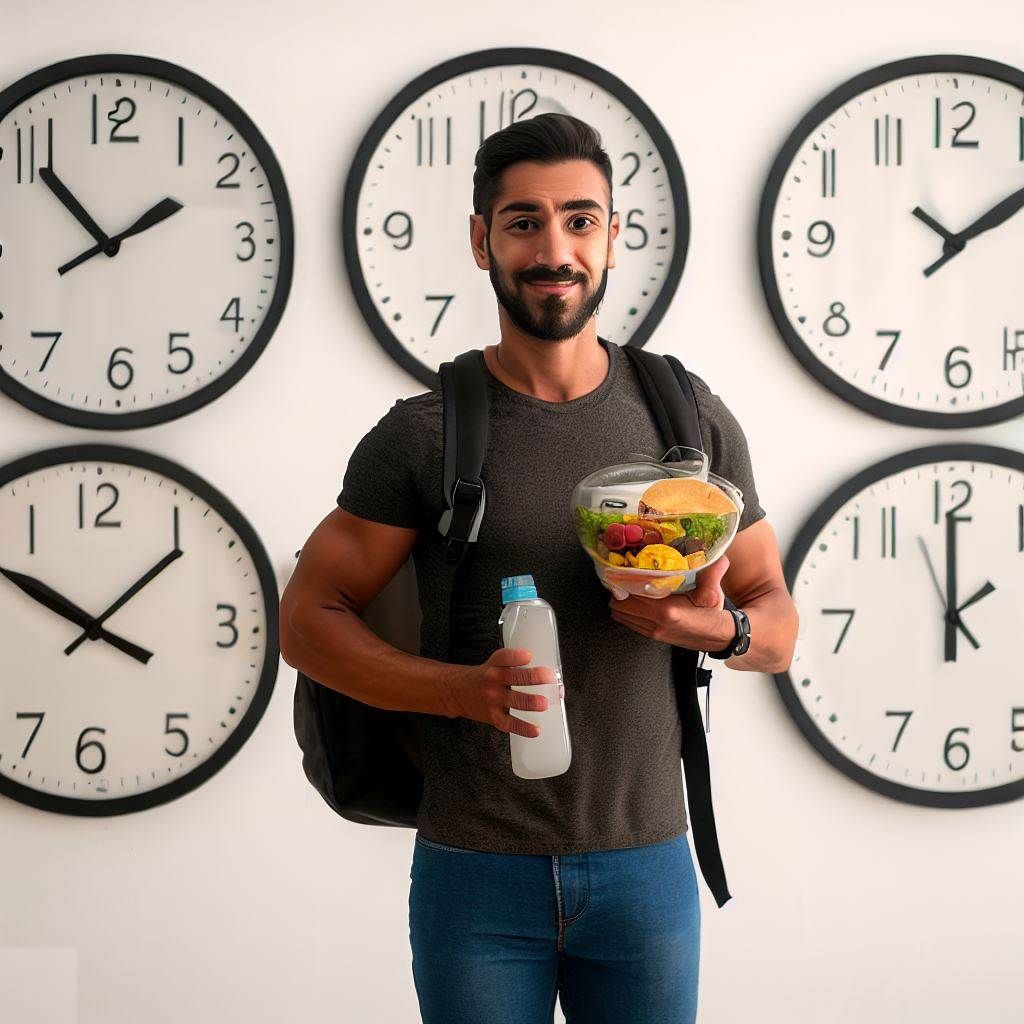Are you planning a trip soon? As exciting as traveling can be, it also comes with its own set of health challenges that you need to be aware of.
From managing jet lag to ensuring food safety, there are several things you can do to stay healthy while exploring new destinations.
Jet lag is one of the most common issues travelers face, especially if they’re crossing multiple time zones.
The fatigue, insomnia, and other symptoms that come with it can make it hard for you to enjoy your trip fully.
However, with a few simple tips and tricks such as staying hydrated during long flights and adjusting your sleep schedule before leaving home, you can minimize the effects of jet lag and start enjoying your adventure sooner.
Managing Jet Lag: Tips and Tricks
 Ready to beat the fatigue and exhaustion that comes with changing time zones? Check out these helpful tips and tricks for managing jet lag!
Ready to beat the fatigue and exhaustion that comes with changing time zones? Check out these helpful tips and tricks for managing jet lag!
One of the most important things you can do is to gradually adjust your sleep schedule a few days before your trip, according to your destination’s time zone. This can help you acclimate more quickly once you arrive and prevent disruption to your internal clock.
Another great way to manage jet lag is by staying hydrated. Dehydration can worsen the symptoms of jet lag, so it’s important to drink plenty of water before, during, and after your flight. Additionally, try to avoid alcohol and caffeine as they can dehydrate you further and disrupt your sleep patterns.
Lastly, consider using natural remedies like melatonin or chamomile tea to help regulate your sleep while adjusting to a new time zone. Melatonin supplements are available over-the-counter in many countries and can help reset your internal clock. Chamomile tea is also known for its calming effects which can aid in relaxation before bedtime.
By following these simple tips, you’ll be able to manage jet lag more effectively on your next trip!
Staying Hydrated during Long Flights
Don’t forget to drink plenty of water during those long flights; staying hydrated is like oiling a rusty hinge, it keeps your body functioning smoothly. The dry cabin air can easily cause dehydration, leading to fatigue, headaches, and even more serious health complications.
To combat this issue, there are several hydration strategies that you can adopt.
Firstly, bring a reusable water bottle with you on the flight and refill it whenever possible. This way, you won’t have to rely solely on the small cups of water provided by the airline.
Secondly, avoid caffeine and alcohol as they can worsen dehydration. Instead, opt for herbal tea or plain water with lemon slices for flavor.
Thirdly, use hydrating skincare products such as moisturizer and lip balm to prevent skin from drying out in the dry cabin air.
Lastly, consider bringing an electrolyte-packed sports drink if you plan on doing any physical activity upon arrival at your destination.
Staying hydrated is crucial when traveling long distances by plane. By following these simple hydration strategies and combating dry cabin air with hydrating skincare products and electrolyte-packed drinks if needed, you can ensure that your body stays healthy throughout your journey.
So don’t forget to pack that reusable water bottle!
Food Safety: What to Know Before You Go
Before you head out on your trip, make sure to learn about food safety so you can avoid any potential stomach issues while enjoying the local cuisine.
Familiarize yourself with the common foodborne illnesses in the area you’ll be visiting and research ways to minimize your risk of exposure. This could include avoiding raw or undercooked meat and seafood, opting for bottled water instead of tap water, and washing your hands regularly.
When it comes to dining out, pay attention to the cleanliness of the restaurant and its kitchen. Look out for signs of poor hygiene such as dirty cutlery or plates, unclean surfaces, or questionable cooking practices.
It’s also important to be cautious when buying street food from vendors who may not have access to proper refrigeration or sanitation facilities. Consider sticking to cooked foods that are served hot and fresh.
In addition, pack some basic items in your travel kit that can help prevent food-related illness such as hand sanitizer, wet wipes, and resealable bags for storing leftovers.
By taking a few extra precautions before and during your travels, you can reduce your chances of getting sick from contaminated food and fully enjoy all the delicious flavors that local cuisine has to offer.
Staying Safe in New Destinations
As you venture into new destinations, it’s important to keep yourself safe and aware of your surroundings, so that you can fully enjoy the experience.
One way to do this is by immersing yourself in the local culture and customs. This not only allows you to gain a deeper understanding of the place you’re visiting, but it also helps you blend in with locals and avoid standing out as a tourist.
However, cultural immersion can come with its own set of challenges. For instance, language barriers may make it difficult for you to communicate effectively with locals or ask for help when needed. To overcome this challenge, consider learning some basic phrases in the local language before embarking on your trip.
Additionally, try downloading translation apps or carrying around a pocket dictionary to help bridge any communication gaps.
Another important aspect of staying safe while traveling is being cautious when exploring new areas. Always research the neighborhoods that you plan on visiting beforehand and avoid going out alone at night if possible.
It’s always better to be safe than sorry – so don’t hesitate to ask hotel staff or locals about any areas that are known for being unsafe or dangerous. By taking these precautions, you’ll be able to enjoy all that your destination has to offer without putting yourself at risk.
Maintaining Your Well-being While Traveling
You’ll want to make sure you’re taking care of yourself while on the go, so think about packing healthy snacks and finding time for exercise. Maintaining your well-being is essential when traveling, especially if you’re going to a new place with different local healthcare options and cultural considerations.
Here are three tips to help you stay healthy while exploring:
1. Take advantage of local produce: When traveling, it’s easy to indulge in unhealthy foods or skip meals altogether due to a busy schedule. But try to incorporate fresh fruits and vegetables into your diet whenever possible. Not only will this help keep your energy levels up, but it can also boost your immune system.
2. Stay active: Even if you don’t have access to a gym or fitness center, find ways to get moving throughout the day. This could mean going for a walk or jog around the city, doing bodyweight exercises in your hotel room, or joining a yoga class at a local studio.
3. Prioritize sleep: It’s tempting to stay out late and explore all that a new destination has to offer, but don’t sacrifice sleep in the process. Jet lag can wreak havoc on your body, so try adjusting your sleep schedule before leaving home and aim for at least seven hours of rest each night.
Remember that maintaining your well-being while traveling is crucial not only for enjoying the trip but also for preventing illness or injury that could cut it short. By incorporating these simple strategies into your routine, you’ll be able to fully immerse yourself in your travels while feeling healthy and energized along the way!
What are some natural remedies for jet lag?
You may be skeptical about natural remedies for jet lag, but there are effective methods that have been used for centuries.
Herbal supplements like melatonin and valerian root can help regulate your sleep cycle and promote relaxation.
Acupuncture treatments can also be beneficial in reducing fatigue and improving overall well-being.
Hypnosis is another good option – it works with your subconscious mind so there’s nothing to do apart from listen to an MP3.
While these remedies may not work for everyone, it’s worth trying them out before resorting to medication or other interventions.
Remember to always consult with a healthcare professional before starting any new supplement or treatment plan.
How can I avoid getting sick while traveling on public transportation?
To avoid getting sick while traveling on public transportation, it’s important to have a sanitizing routine. Bring hand sanitizer and use it frequently, especially after touching common surfaces like the handles or buttons on buses or trains.
You should also try to avoid crowds as much as possible by traveling during off-peak times or taking alternative modes of transportation. If you can’t avoid crowded areas, wear a mask to protect yourself from airborne illnesses.
By being proactive with your sanitizing routine and avoiding crowds, you can minimize your risk of getting sick while traveling on public transportation.
Is it safe to eat street food in foreign countries?
Are you a foodie who loves to try out new culinary experiences while traveling? If so, you might be wondering if it’s safe to eat street food in foreign countries.
While street food can offer unique cultural experiences and tasty treats, it’s important to consider the food hygiene practices of the vendors. To avoid getting sick from contaminated food, look for stalls that are clean and well-maintained.
Additionally, make sure that the food is cooked thoroughly before consuming it. Remember, indulging in local street foods can be a great way to experience new cultures and flavors as long as you take precautions to ensure your safety.
What should I do if I have a medical emergency while traveling abroad?
If you find yourself in a medical emergency while traveling abroad, the first step is to seek out healthcare immediately. This can involve finding a local hospital or clinic, or contacting your travel insurance provider for assistance.
It’s important to be prepared for emergencies before you leave by researching healthcare options and purchasing adequate insurance coverage. Additionally, packing a basic first aid kit with items such as bandages, antiseptic wipes, and pain relievers can help in minor situations.
Being proactive about emergency preparation can make all the difference in ensuring your safety and wellbeing while traveling internationally.
Can I bring my own water bottle on a flight?
You’re ready for your flight and wondering if you can bring your own water bottle on board. Just double check the rules as they can vary from country to country.
The answer is yes! Bringing a reusable bottle not only benefits the environment, but it also saves you money by avoiding expensive airport drinks.
Plus, many airports now offer water refill stations where you can fill up your bottle after passing through security.
Just make sure to empty your bottle before going through security and check with the airline for any specific rules or restrictions regarding outside bottles.
So go ahead and pack that trusty reusable bottle for your next adventure!
It’s crucial to take care of your health while traveling. Jet lag, dehydration, and food safety are just a few factors that can affect your well-being during your trip.
By following the tips and tricks mentioned above, you can manage jet lag, stay hydrated during long flights, and ensure food safety while trying out new cuisines.
It’s important to remember that staying safe in new destinations also entails being extra cautious with your surroundings. Just like how a captain navigates through rough waters to keep the ship steady, you must be vigilant and aware of potential risks in unfamiliar territories.
Maintaining your well-being while traveling requires effort, but it will ultimately lead to a more enjoyable experience. Don’t let minor health issues dampen the excitement of exploring new places; take charge of your physical and mental health so you can fully immerse yourself in the wonders of travel.









